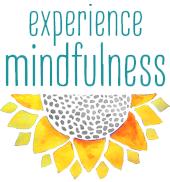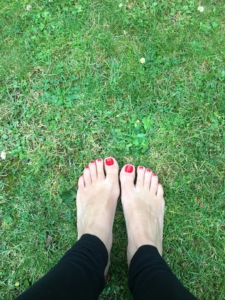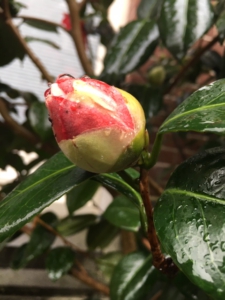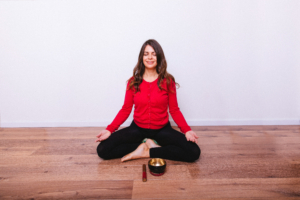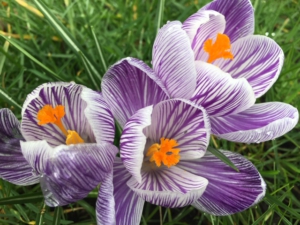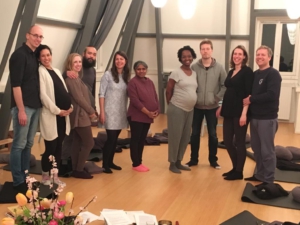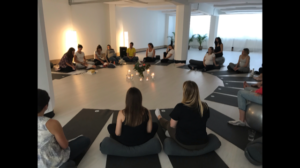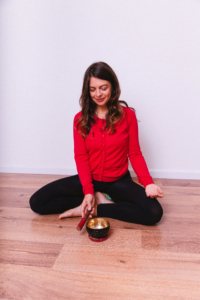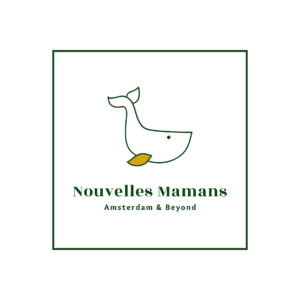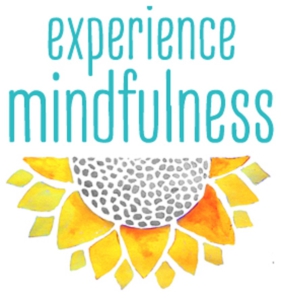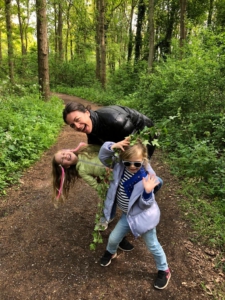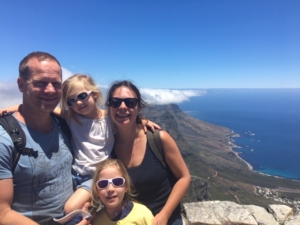I had the pleasure of being interviewed by Delphine Petit, kraamzorg (maternity care nurse at Aide Maman Amsterdam. Read her interview of me below.
Can you please tell us who you are and what exactly is a Doula and Mindfulness.
Firstly, thank you Delphine for this opportunity to highlight the work I do, which I feel very passionate about.
My name is Marjorie Lumet. I am originally from France and have been living in Amsterdam for 12 years with my South African partner and my girls who are now 5 and 9. I am a mindfulness coach, mindful birthing & parenting trainer and doula.
A doula is someone who supports the birthing woman and her partner physically and emotionally during the process of giving birth. This can be at times very hands-on: massage and acupressure for pain relief or relaxation, supporting with positions, breathing techniques and general comfort, facilitating and guiding partner support. Emotional support is also key in this intense moment, encouraging words, cheerleading, reassurance. A doula’s role is to support the birthing woman and her partner to feel safe and remain centred and calm. This also entails creating a peaceful environment in the birthing room. A doula does her best to ensure the mother’s wishes are respected as much as possible.
Birth is a very intimate and special moment in a couple’s life so the role of the doula is to be of service, to observe what is needed, give support where required and hold space when desirable. Research shows that continuous support from a doula shortens the length of labour and very significantly reduces the need for pain medication and for medical interventions, such as administering Pitocin or cesarean birth.
Usually, a doula’s role begins before birth with prenatal preparation sessions during which the birthing couple share their concerns and wishes around birth. A doula provides information and resources so that the birthing couple can understand their options and make informed choices.
A doula is also sometimes skilled to give a birth preparation course. This is my case where I train couples in mindfulness skills which are of great support in birth and well beyond.
Mindfulness is present moment awareness with a non-judging and curious attitude. Paying attention in this way is deeply transformative. It allows us to open up to our full potential which is often limited by stress and unhelpful mental beliefs & behavioural patterns. Cultivating mindfulness allows us to develop another way of looking at ourselves and the world around us, a more positive, open and kinder way. Instead of spending considerable amounts of energy replaying the past, stressing or worrying about the future, our work, relationships and all the things we need to get done, we are able to gather our attention to fully enjoy the moments of our life as they unfold. Through non-reactive observing, we respond consciously to stress and difficulties that arise rather than react automatically. Over time we liberate ourselves from a lot of unnecessary stress and release unhelpful beliefs or habits we’ve developed over the years. We begin to make space for what really matters and supports us to thrive. Mindfulness supports us towards more well-being, joy and harmony in our lives as we live them.
And it is not just me saying all this, mindfulness is very widespread nowadays because the need is huge. There is an extensive body of research demonstrating the many benefits of mindfulness on physical and mental health as well as emotional resilience
That said, you can probably imagine that inviting the practice of mindfulness into your life before becoming a parent is of immense support. It’s more than just a good idea to “sort yourself out” before becoming full-time responsible for a cute being that is totally dependent and fused with you.
Parenting is very much about being in the present moment, paying attention to our children. Children thrive on compassionate attention. It is a solid foundation for them to develop on. However, if a person doesn’t relate to themselves with kind presence, it will be very difficult for them to bring this compassionate attention into their parenting.
Additionally, becoming a parent is probably one of life’s biggest transformations. As joyful as it may be, this rapid change also comes with its fair share of stress. And stress and pregnancy isn’t a good combination as we know. Learning mindfulness in pregnancy allows to reduce stress, to slow down, relax and tune into the amazing pregnant body that is transforming rapidly as well as honour its needs.
Last but certainly not least, mindfulness is an invaluable skill in birth itself. Birth is all about remaining centred and breathing through intensity as well as relaxing as much as possible in between contractions. Our conditioned reactivity to pain, which usually consists in ignoring it, pushing it away or fighting it isn’t helpful obviously in birth. The mindfulness skills couples learn support them to be with discomfort, to relax into the pain. To keep attention focused on the body and breath rather than get caught up in emotional reactivity or fearful thoughts. We do a few series of pain practices together (holding ice cubes) and use a variety of techniques to work more skilfully with the fear or pain that may arise in birth. These techniques include mindfulness, focused attention, breathing and sounding, touch & massage, visualisation and positioning. In childbirth the pain is part of a transformative process allowing a child to be born. The less we fight it, the less pain we actually experience and the more we support birth to unfold optimally.
I teach private individual courses but also group courses based on the “Mindful Birthing” program developed by Nancy Bardacke, an American mid-wife and mindfulness teacher who has been a pioneer in bringing mindfulness skills to expecting families.
How did you come up with the idea of working especially with mothers?
Through my own experience really. Becoming a mother, propelled my journey into mindfulness. Before being a mindfulness coach, I worked in the corporate world for 15 years in media agencies. When I became a Mom the corporate environment I was in, including the rhythm and structure, just didn’t fit with my needs, values and concerns in my new Mom life. I felt frustrated. I was always running trying to keep up with my life rather than living it, enjoying it.
For a long time, I lacked purpose in my job but I felt this more strongly when I became a Mom. I questioned increasingly what my contribution to the world was and how was I shaping the future. And becoming a mom was a radical life change of course. I found myself wanting to spend more time with my daughter, slowing down to enjoy her and watch her grow rather than outsourcing that as much as I was to childcare. I wanted to be healthy and happy and juggling motherhood and a demanding corporate job I didn’t feel passionate about wasn’t delivering on that. So, in my desperation I discovered mindfulness. I attended an 8-week course and was so inspired that halfway through the course I decided to train as a teacher so I could share these skills with my environment.
I now know through my clients that my own journey of adjusting to motherhood is certainly not isolated but shared by most women. There’s a name for it ‘matrescence’, the process of becoming a mother, encompassing all the many physical, psychological and emotional changes after birth. New parents often feel inadequate, insecure, guilty as if they aren’t doing anything right. I feel passionate about equipping mothers with solid mindfulness skills and guide them through this transition from pregnancy to early parenting. To encourage them as they enter this nurturing role to nurture themselves too. Many of us haven’t learned this and our modern environment often depletes rather than nurtures with its distractions and hectic pace at times. Dad’s obviously go through an immense shift too and the more connected couples are, the better equipped they are to grow together and support one another.
I love working with pregnant and new Moms for all these reasons but I don’t work with them exclusively. I also cater to students, plenty of men and women with or without families, high-achieving professionals suffering from stress-related complaints or wanting to bring about positive transformation in their lives. I love having that diversity and I feel it helps me keep an open mind. Plus, I get to witness how the skills I teach are precious for anyone regardless of their life situation.
Can you tell us what a family can expect from your sessions? How do you work?
I give a lot of different courses and workshops but I’ll focus on my offering to expecting parents.
I work both in a group and individual setting.
The gold standard mindful birth preparation course is the 8-week course that combines mindfulness and childbirth education. In this course, couples learn in depth the practice of mindfulness and also have a solid birth preparation course including attention to early parenting.
I facilitate this in a group setting and sessions last 2,5 hours. Each session offers a combination of mindfulness meditation, childbirth theory & education and group sharing and questions. The body needs to move so we always have time for stretching, I integrate movement practices, combining prenatal yoga postures and Qi Gong. Sometimes we do specific birth practices that can be quite hands-on, for instance birth positions and partner support where we use touch, massage and acupressure points. In a group setting, group reflections are also important to the learning process and create a sense of community.
I also offer shorter courses and workshops to cater to different needs, a 5-week course as well as a series of 3x workshops to prepare together for birth.
For private sessions I come to the family’s home and adjust the course content to their specific needs. I can also offer a pregnancy relaxation massage.
My group courses are mostly in English but individual courses can be in French. And I also speak pretty fluent Dutch and Italian which is handy to know
What is “Nouvelles Mamans “?
Nouvelles Mamans’ is a community aimed at making the journey into parenthood just a little bit smoother through offering support, connection and information to new and expecting parents. We host regular events always around a specific theme relevant to pregnancy, birth or early parenting. There is some knowledge sharing around the theme and plenty of space to share stories, concerns and experiences in a warm, informal and non-judgmental setting.
The events we host are in English and French language depending on attendees. We cater to French families as well as a larger expat audience. Starting a family away from home, in a different culture and system can be disorientating, isolating and challenging at times so I believe the power of community is important. Dutchies are very welcome of course too and we’ve had the pleasure of having quite a few locals attend. We love having babies, kids and partners so the whole family is warmly welcomed.
I launched this initiative earlier this year in January. A group of birth workers offer their regular support as well. We are a team of 4 at the moment and have expertise in different areas: mindfulness, yoga, massage, Chinese medicine, dance and have in common a holistic approach.
On top of our professional experience, we are all mothers and have experienced what it is like giving birth and raising our kids in the Netherlands. We share our personal experiences where relevant and offer professional support and information where needed and possible. Finally, most of us have quite an international background but we have a French connection in common, hence our name
Why the name “Experience Mindfulness”?
That’s a great question which no one has ever asked me before so thank you for bringing it up.
I believe it sums up the essence of Mindfulness. Mindfulness or presence if you will is not something that can really be cognitively explained. You could read 100 books on it and yet not fully grasp it. We tend to get so stuck in our heads and forget that there are other ways to know. It is something that needs to be experienced directly, it is a felt sense of the experience of being alive. When you experience mindfulness, practice it, feel it, understand how it is impacting your body and mind, then you can go beyond the concept.
In mindfulness we move from thinking to feeling which is all about experiencing what is. We pay attention to our senses, to sensations in the body, we connect to our whole being. The body is an anchor to our awareness, always available, always giving signals.
Bringing more present moment awareness in our lives may sound simple but it is not easy, this process requires commitment and regular practice or experience !
Can you tell us what makes you Happy?
YES!
Every morning, I spend about an hour practicing mindfulness and yoga or Qi Gong. sometimes I go running and then meditate. I enjoy this morning ritual and it helps me start the day with positive energy. If I skip it, I really feel the difference.
My kids make me happy, although sometimes they really irritate me too of course
But what I really enjoy is when we have quality time. I notice that this is facilitated by having nothing on the agenda, just unstructured play or connection time. I try to make room for a short moment of real connection every day with both of them, mostly following their agenda.
Being in nature is also a great source of happiness, nature calms and energizes me. I am definitely an outdoors person and I really need my daily walk in the park.
Traveling and backpacking, learning new languages and discovering new cultures used to be a passion of mine, nowadays I enjoy our family holidays. My partner is South African and I love visiting there. The nature is so grand and wild, these big open spaces help me feel free and even more alive if that makes sense.
And my work makes me happy. For years my work was not a source of joy or even satisfaction. Now I love what I do I allow my curiosity and intuition to guide me as I further develop my skills, they are my new “boss”, it is so liberating! I enjoy guiding and coaching clients. I witness sometimes amazing transformation which is very inspiring and rewarding.
